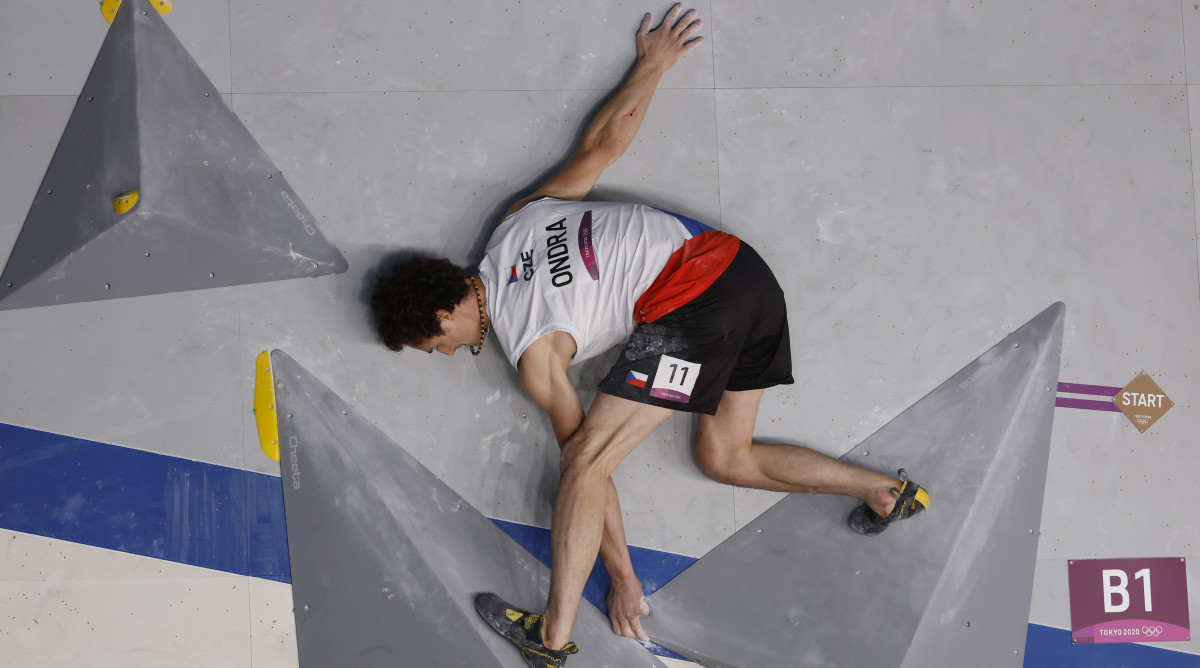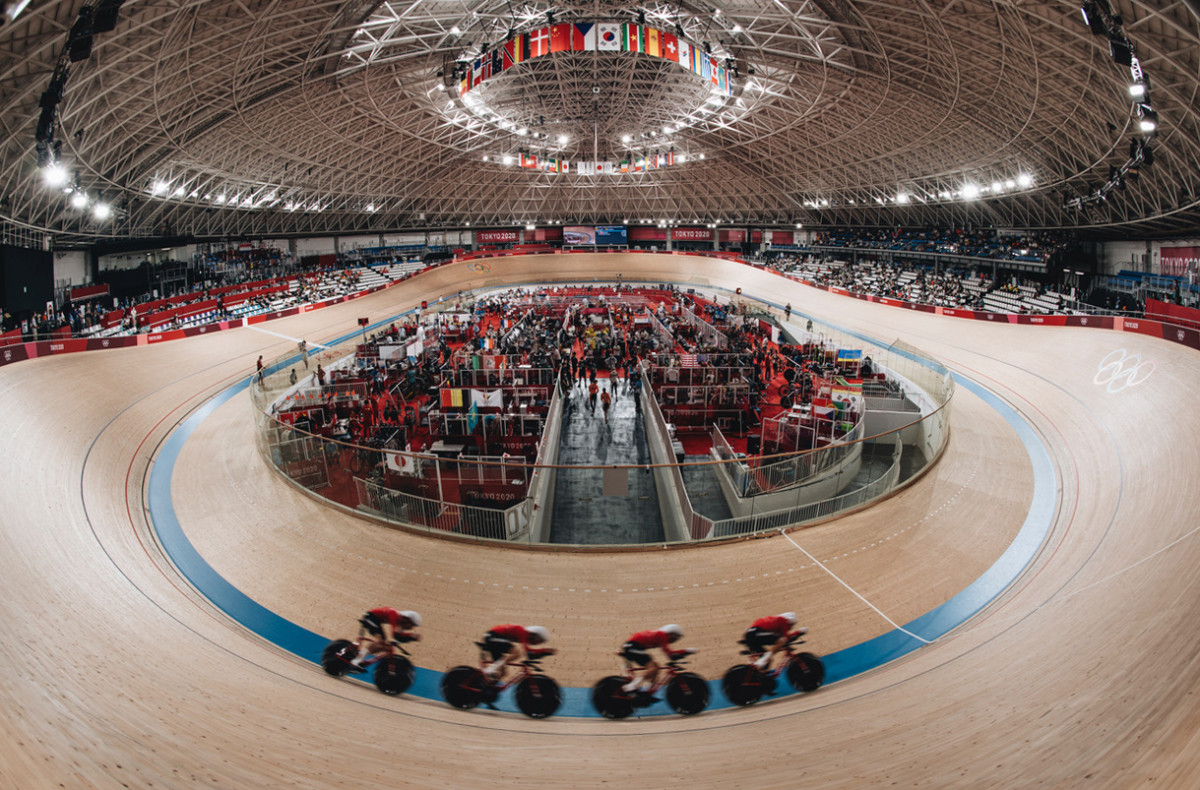Sport Climbing's Olympic Debut Was Frantically Thrilling

Very Olympic Today is SI’s daily Olympics newsletter. You can receive each issue for free in your inbox by subscribing here. To continue reading the newsletter at SI.com every day, along with the rest of our Olympics coverage, readers can subscribe to SI.com here.
I’m not sure what I had in mind when I tuned into sport climbing’s official Olympic debut, but upon seeing it for the first time, the initial word that came to mind was: frantic.
I pride myself on being prepared—I am the guy who previewed every single sport before the Opening Ceremony—but I admit I didn’t quite do all of my homework on the climbing. In all those hours I spent scrolling through YouTube for highlights of past Olympic canoe slalom and archery and badminton events to remember what I love about those sports, I never thought to find a video of what one of this year’s new sports would actually look like. I had read about the sport’s format, but it took about 14 seconds of watching it—two trips up the 15-meter speed wall—for me to be hooked.
For those unfamiliar, and who weren’t up at 4:00 a.m. ET to stream it on one screen while watching gymnastics on another, climbing is split into three disciplines. Climbers compete and have their place finish in each one multiplied into one combined score. These are my first impressions.

Speed climbing: This was the frantic one. Two at a time, climbers raced up adjoining walls in six or seven seconds. It was like watching elite video game speed racers, where every single movement is predetermined and you can’t be even a hair off or your chance of hitting your time is destroyed. I couldn’t look away.
Lots of FRANTIC energy at the speed climbing. Most runs are 6-7 seconds. No time to be anything but perfect. Broadcasters speaking very fast when they get climbing. pic.twitter.com/CtE2BiiZnD
— Mitch Goldich 🐙 (@mitchgoldich) August 3, 2021
Bouldering: This was much more strategic! It was not exactly a race; climbers just had a set time to figure out how to get to the top of various boulder problems with no ropes. It was fun to watch them think and try different strategies from previous competitors. There was an obscene amount of chalk, and there were dudes who thought it would be easier to be upside down. I have decided I like the scoring format that equally weights these very different skill sets.
Lead: This is similar to the bouldering, except they go up a seemingly endless wall, clipping themselves into carabiners as they contort themselves, stretch their limbs, hold their body weight in their fingertips and wedge shoes that are two sizes too small into tiny crevices as they get farther and farther from the safety of the floor.
Is it an Olympic sport? Well, I saw it at the Olympics, didn’t I?
With host countries now enjoying new liberties to add sports each Olympiad, we are destined to have even more frequent debates about which sports belong and which don’t. It’s hard to say what a true Olympic sport is. Running and wrestling, of course. Swimming, yeah that seems pretty well settled. But I definitely have had mixed feelings about some of the newer events being added. And I’m not sure if the general public’s reaction to skateboarding and 3x3 has truly prepared us all for breakdancing in 2024.
But I think one thing that has happened as I’ve consumed these Olympics is that my eyes have been opened. I’ve always enjoyed the quirkier sports anyway, so maybe I’ve learned to just lighten up and enjoy the ride. It’s not as if Zeus himself came down from Mt. Olympus with the official list of sports.
Indoor volleyball was added in 1964, and beach volleyball in ’96. Handball arrived in ’72 and table tennis in ’88. Sports like tennis, golf and archery disappeared for decades and came back. Much of the Olympics are already so arbitrary. How did they pick those particular bikes? Those particular boats? Those particular distances from which to shoot those particular clay pigeons?
So I gave sport climbing a chance, and it turned out I was very entertained. I got to see clearly athletic people perform clearly impressive maneuvers. And even if I don’t watch this sport again for three more years, I’ll be happy to see it on my screen again next time. For most of the world, that’s pretty much what the Olympics are all about.
Track and field
It was another memorable day at the track. It began Monday morning (U.S. time), where it started absolutely downpouring in the middle of the meet. Maybe you saw some of the highlights of the races on the track in the rain. I couldn’t believe they didn’t stop the field events earlier than they did. I was watching the discus as one competitor had it slip out of her hand and another slipped and fell in the throwing the circle.
Pole vault too. What are we doing here? pic.twitter.com/VjHjnKjExt
— Mitch Goldich 🐙 (@mitchgoldich) August 2, 2021
It seemed wildly unfair to me to force some competitors to throw in totally different conditions. Even if you set aside the athletes literally slipping, it just stands to reason that a discus hurtling through the sky would be affected by a torrential rain storm. It’s not like rugby or beach volleyball, where both teams are dealing with the same conditions. I love watching sports in the elements as much as anyone, but that just seems like a ridiculous way to determine the Olympic champion. “Oh sorry, you were seventh in order and it started pouring while No. 6 was up. Better luck in Paris.” (They did eventually stop things.)
Elsewhere: I felt terrible for Sandi Morris, who won silver in the pole vault in Rio, and then injured her hip and broke her pole during qualifying in Tokyo. You can read more from Yahoo here.
But the moment that will stay with me the longest is the men’s 400-meter hurdles, which some people who follow track more closely than me are calling the greatest race in that event’s history, and one of the greatest races of any kind in Olympic history.
For those who missed it, Norway’s Karsten Warholm crushed the world record and had a great reaction. You know what, just watch it:
WORLD RECORD‼️
— NBC Olympics & Paralympics (@NBCOlympics) August 3, 2021
Norway's Karsten Warholm breaks his OWN world record to win gold in the men's 400m hurdles and @TeamUSA's Rai Benjamin wins the silver. #TokyoOlympics
📺 NBC
💻 https://t.co/ZOFdXC4e4u
📱 NBC Sports App pic.twitter.com/lPSNrv2Qoo
Here’s what you should know for a little more context. Rai Benjamin also broke the world record, but won a silver medal for his efforts. From NBC’s Nick Zaccardi: Warholm lowered the world record by .76 seconds, a 1.6% drop. Michael Johnson’s famous WR in the 200 in 1996 broke the record by .34 seconds, a 1.7% drop. And my favorite, from USA Today’s Tom Schad: Warholm’s time was faster than 18 runners in the regular old 400-meters, who didn’t have to leap over 10 hurdles during the race. That’s incredible.
While You Were Sleeping
Gymnastics
Simone Biles made her dramatic return to competition and won a bronze medal on the balance beam. It’s her seventh Olympic medal, matching Shannon Miller’s total and making them the two most-decorated gymnasts in U.S. Olympic history.
She simplified her dismount so that she wouldn’t have to do any twisting, which helped, given her issues with “the twisties” in Tokyo. It was not a perfect routine, but it came under a tremendous amount of pressure and was good enough to land her on the podium. Just because she has so many gold medals doesn’t mean we should lose sight of how hard it is to win an Olympic bronze.
I don’t think she had to come back and win a medal to silence her critics (many of whom were acting performatively or trolling in bad faith). I think walking away would have been understandable. Returning but falling short of the podium would have been as well. But coming back and winning a medal under that spotlight, given how tough her week was, is a massive achievement.
As I wrote on Twitter, I don’t think we should center the narrative of her entire week around her overcoming adversity to win a medal. I think she spurred on an important conversation that would have been ongoing whether she won or lost. But it sure is a satisfying ending to the Tokyo Olympics, and another memorable performance from an all-time athlete.
Basketball
The U.S. men advanced to the semifinals with a 95–81 win over Spain. Don’t let the final score fool you; the U.S. covered the spread, but this was definitely a tough game.
Spain led 21–19 after the first quarter (Ricky Rubio had 13 of his 38 points in the first eight minutes) and pushed it to double figures in the second quarter. Kevin Durant was the star of the game (outside of Rubio, at least), with 29 points. Spain had won medals in three straight Olympics, and had a roster deep with NBA experience. But the U.S. had enough star power to beat them back and pull away in the fourth.
I made the case before the game that this was the team’s most important game of the tournament. I know that may seem counterintuitive. You’d think the semifinal round is more important, and the final is more important than that. But this was a truly win-or-go-home-with-nothing game. If the U.S. loses in the semifinals, it can still play for bronze. If it loses in the finals, it will have already clinched a silver. But we’ve known for a while that the gold medal is far from guaranteed, and in my mind the difference between a gold or a silver or a bronze isn’t anywhere near as big as the difference between winning something and coming home totally empty-handed. In short: Losing this game would have made the entire tournament a colossal disaster. Anyway, they didn’t. The U.S. now awaits the winner of Australia and Argentina.
Glass half empty: The team has looked vulnerable all tournament and might not be good enough to win it all unless it plays well for a full 40 minutes. Glass half full: The team has gotten some good experience learning to battle in tight games. We’ll see which narrative survives through the next two games.
Water polo
The U.S. women came out on fire and routed Canada 16–5 in the quarterfinals. The U.S. led 7–1 after the first quarter and just coasted from there. I don’t even have much to say about the game. Maggie Steffens, Makenzie Fischer and Alys Williams all scored three goals. Ashleigh Johnson was great in goal. The best team in the world moves on to the semifinals.
Badminton
I did not know that badminton players engage in the time-honored sports tradition of postgame jersey swaps! Now I do, and so do you.
During the men’s singles badminton final last night, Olympic champion @ViktorAxelsen of Denmark traded shirts with silver medallist Chen Long of China as a symbol of respect to his opponent. ❤️🏸
— The Olympic Games (@Olympics) August 3, 2021
View the thread below to see where this beautiful tradition started!@bwfmedia pic.twitter.com/hQJ8XfObbc
Snapshots from Tokyo
From the canoe slalom course to the rugby stadium to the velodrome, SI’s photographers have been taking great pictures all over Tokyo. Here’s our latest photo gallery.

What to Watch
Tuesday night and Wednesday morning, all times ET.
Medals
Track and field: The evening session starts at 8:00 p.m. Tuesday, with medals given out in the women’s 400-meter hurdles (keep an eye on both Dalilah Muhammad and Sydney McLaughin). The morning session starts at 5:30 a.m. Wednesday, with medals in the women’s 3,000-meter steeplechase, men’s hammer throw, men’s 800 and men’s 200 (Noah Lyles time).
Skateboarding: The women’s park final starts at 11:30 p.m. Tuesday, prelims at 8 p.m.
Marathon swimming: The women’s open water 10K starts at 5:30 p.m. Tuesday. The winning time should be a little under two hours.
Sailing: Men’s and women’s two-person dingy medal races start at 1:33 a.m. Wednesday
Boxing: There are six semifinal bouts, plus one gold-medal match between Great Britain’s Benjamin Whittaker and Cuba’s Arlen Lopez at 2:35 a.m. Wednesday
Cycling: The men’s team pursuit finals start at 4:59 a.m. Wednesday
Equestrian: The jumping individual final starts at 6:00 a.m. Wednesday
Synchronized swimming: The duet free routine finals start at 6:30 a.m. Wednesday
Weightlifting: The final day of weightlifting features the men’s 109-kg class, with finals at 6:50 a.m. Wednesday
Team USA
Golf: Round 1 of the women’s tournament starts at 6:30 p.m. Tuesday
Canoe sprint: A full session of various races starts at 8:30 p.m. Tuesday
Wrestling: The session starts at 10 p.m. Tuesday, with Thomas Patrick Gilman, David Taylor and Helen Maroulis all in action. Last month I had a Q&A with Maroulis, who in 2016 became the first U.S. woman ever to win a gold in wrestling. But she has a tough bracket, with another former Olympic champ in her way.
Baseball: The U.S. plays at 11:00 p.m. Tuesday against the winner of Tuesday morning’s game between Israel and the Dominican Republic. The U.S. lost a game early Monday morning (U.S. time) against Japan, 7–6 in extra innings. The team was up 6–3, but allowed Japan to tie the score in the ninth. For those unaware, extra innings start with runners on first and second base, one more runner than the controversial rule MLB has used the last two seasons. After the U.S. was held scoreless in the top of the 10th inning, Japan ended things in the bottom of the first extra frame. They can still battle back to the gold-medal game though.
Volleyball: The U.S. women have a quarterfinal against the Dominican Republic at midnight
Basketball: The U.S. women have a quarterfinal against Australia at 12:40 a.m. Wednesday
Water polo: The U.S. men have a quarterfinal against Spain at 1: 00 a.m. Wednesday
Boxing: Oshae Jones has a semifinal bout against China’s Hong Gu at 1:48 a.m. Wednesday. Richard Torrez Jr. has a semifinal bout against Kazakhstan’s Kamshybek Kunkabayev at 2:18 a.m. Wednesday.
Diving: The women’s platform preliminaries start at 2:00 a.m. Wednesday
Sport climbing: The women’s climbing event starts at 4:00 a.m. Wednesday
Caz’s Medal Picks
Every day Brian Cazeneuve will give us a few medal predictions for some upcoming events.
Track and Field women’s 400-meter hurdles
Gold: Sydney McLaughlin (U.S.)
Silver: Dalilah Muhammad (U.S.)
Bronze: Janieve Russell (Jamaica)
In 2016, McLaughlin, then 16, became the youngest athlete to make a U.S. track & field team since 1980. In July, she broke Muhammad’s world record, clocking 51.90 seconds.
Track & Field, women’s 3000-meter steeplechase
Gold: Beatrice Chepkoech (Kenya)
Silver: Hyvin Kiyeng (Kenya)
Bronze: Emma Coburn (U.S.)
Chepkoech set the world record (8:44.32) in 2018. Coburn won the world title in 2017 after an Olympic bronze in 2016.
Boxing men’s 81 kg
Gold: Arien Lopez (Cuba)
Silver: Ben Whittaker (Great Britain)
Bronze: Imam Khataev (ROC)
Bronze: Alfonso Dominguez (Azerbaijan)
Though prolific in many weight classes, Cuba won gold in this division for the first time in 2016.
Weightlifting, men’s 109 kg
Gold: Lasha Talakhadze (Georgia)
Silver: Hojamuhammet Toychyyev (Turkmenistan)
Bronze: Ali Davoudi (Iran)
Talakhadze received a two-year doping ban for stanozolol in 2013.
SI’s Best
This is a must-read from Stephanie Apstein, who spoke to paralyzed former gymnasts about Simone Biles’s decision
Pat Forde from the USA-Spain basketball game
Michael Rosenberg on that incredible 400-meter hurdles
Greg Bishop on Colton Brown, a judoka who knew his sport required addressing his mental health
Alex Prewitt wrote about New Zealand kayak legend Lisa Carrington
As a reminder, this newsletter is free if you sign up to receive it in your inbox. You can also subscribe to SI.com for unlimited access to all the other great stories on our site.
Whew, another big day. Things will only get more exciting as some of these longer tournaments get into the medal rounds. Stick with me for five more days. Thanks for reading.
—Mitch
